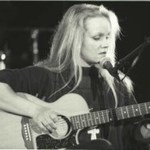1996年11月,默默无名的Eva Cassidy因为皮肤癌离开人间,当时人们只能在美国华盛顿特区的几家民谣/爵士Club听闻此号人物,当年她才33岁。
现在,Eva Cassidy的音乐成为全球市场一致肯定的心灵歌声,她的「Songbird」专辑在今年三月登上全英专辑排行榜后座,最近更掀起全球抢购,除了亚马逊'Amazon'佳评如潮登记四月最畅销专辑之一,英国BBC民选统计的20世纪最伟大歌手名单,Eva Cassidy名列第21位,这股「Eva 热」连带使所有Eva Cassidy的专辑一时之间都令爱乐者大举搜集,在流行歌坛可说是相当罕见的现象,美国权威娱乐周刊杂志也在最新一期大幅报导Eva的种种故事。
或许冥冥中的安排,上天虽然赶着让Eva早些升天当天使,但Eva Cassidy动人的歌喉却还是保存下来,五年之后流传全球,包括在中国台湾的我们也感染到了,目前包括Power 989等电台或者是学术网络纷纷争相播送感动音符并传递Eva的歌声魔力。Eva的爸爸对她的成功也发表他的心情,「Eva从不想成名,她的热情都用在歌唱和艺术创作上」,当然,女儿不在身边仍让他难过不已,更何况女儿的音乐才情也都遗传自父母。
Eva的专辑大部分由美国独立厂牌Bix Street发行,故事是这样开始,99年BBC电台的DJ 制作Paul Walters无意从美国友人手上拿到Eva Cassidy 98年的「Songbird」专辑,Paul听到Eva Cassidy翻唱茱蒂嘉伦〈Judy Garland〉的〈Over The Rainbow〉后,觉得这是第一次有人可以把这首歌唱的毫不逊色原唱,甚至夺走茱蒂的光彩,当时〈Over The Rainbow〉在电台播送后,马上席卷英国,BBC接获数百通电话要求介绍歌曲,因为这是他们听过最迷人的歌声,不过一直到去年12月〈Over The Rainbow〉被用在BBC电视台大量放送并搭上英国慈善活动,完全引爆Eva Cassidy的歌声魅力,一时之间她的唱片在英国缔造销售奇迹,不少歌迷在推荐Eva时更不忘叮咛听她的歌可要准备面纸,很容易听了就想哭。
事实上,「Songbird」专辑并不是她身前最后的录音,却是收录过去「Eva By Heart」、「Live At Blues Alley」、「The Other Side」三张专辑精华佳作,从第一首现场翻唱Sting的〈Field Of Gold〉开始,每一个Eva唱出的音符,歌词也好,轻吟也好,都是深切感人,我觉得这已经不是「天籁」〈天籁或多或少遥不可及〉可以形容,因为Eva的歌声是接近心底,再加上Eva的吉他弹奏,「Songbird」成为一张毫无冷场的佳作无庸置疑。
谈到vocal,Eva厉害的是她演绎歌曲的范围宽广,在这部分是相当令人惊喜,不管是传统的流行乐曲、蓝调、爵士、民谣、灵魂、福音,她的嗓音变化万千,可是最难得的是,Eva的随性和自然可以驾驭每首她要表达的歌,像〈Wayfaring Stranger〉的唱功和情绪的完整,表达她的演唱企图绝非只是要cover歌曲,Eva Cassidy赋予歌曲全新生命,又如翻唱Fleetwood Mac女主唱Christine McVie的〈Songbird〉她从合声到弹奏几乎一手包办,歌声透露出清澈心灵的悸动,而演唱灵魂大师Curtis Mayfield的〈People Get Ready〉改以灵魂唱腔再搭上电吉他,整首歌彷佛带人回到过往时代的细致韵味,〈Oh,Had I A Golden Thread〉的福音能量又如划过天际的流星闪亮,Eva用她的生命灵魂再唱歌!
2000年唱片公司推出Eva Cassidy最后的作品辑「Time After Time」,收录了包括Paul Simon、Cyndi Lauper、Bill Withers、Joni Mitchell等人的经典作,想当然尔,这些经典到了Eva Cassidy的歌声中又传唱出不同感觉的贴心感动,也是另一张裘弟要推荐给大家的作品。
Eva Cassidy留着一头长发,湛蓝的双眼,还有专辑上的插画作品,实在给世人无限的想念,Eva从不喜欢让自己商业化,坚持留在非主流唱片,总喜欢在星期天陪着妈妈骑着单车出游,享受自然,就像她的歌声一样,Eva唱出彩虹的色彩,而今天全球引发的Eva热潮证明好的音乐经得起时间考验。
The heart-tugging story of Eva Cassidy reads almost like the plot of a Movie of the Week tearjerker. A native of the Washington, D.C., area, the painfully shy Cassidy earned a local reputation as a masterful interpreter of standards from virtually any genre, blessed with technical agility and a searching passion that cut straight to the emotional core of her material. Despite the evocative instrument that was Cassidy's voice, record companies shied away from her, unsure of how to market her eclectic repertoire; for her part, Cassidy adamantly refused to allow herself to be pigeonholed, prizing the music above any potential fame. In 1996, just when she had begun to record more frequently on a small, local basis, Cassidy was diagnosed with cancer, which had already spread throughout her body and rapidly claimed her life. But her story didn't end there; her music was posthumously championed by a BBC disc jockey, and amazingly, the anthology Songbird became a number one million-selling smash in England.
Cassidy was born February 2, 1963, in Oxon Hill, MD, and grew up (from age nine on) in Bowie, MD. She loved music from an early age, particularly folk and jazz (as a girl, her favorite singer was Buffy Sainte-Marie), and learned guitar from her father Hugh. At one point, Hugh put together a family folk act featuring himself on bass, Eva on guitar and vocals, and her brother Danny on fiddle; Eva and Danny also played country music at a local amusement park, but Eva's sensitivity eventually made performances too difficult on her. Something of a loner during her teens, Cassidy sang with a pop/rock band called Stonehenge while in high school. After graduating, she studied art for a short time, but soon grew dissatisfied with what she was being taught, and dropped out to work at a plant nursery. She sang occasional backing vocals for friends' rock bands around Bowie and Annapolis, but was never comfortable trying to overpower the amplification. In 1986, longtime friend Dave Lourim persuaded Cassidy to lay down some vocals at a recording session for his soft pop/rock group Method Actor. (The results were eventually reissued in 2002.) At the studio, Cassidy met D.C.-area producer Chris Biondo, who was immediately struck by her voice and agreed to help her put together a demo tape she hoped would get her more backup-singing work.
Cassidy became a regular presence at Biondo's studio, where he recorded a wide variety of music; incongruously enough, Cassidy performed backing vocals on D.C. go-go funksters E.U.'s Livin' Large album (singing all of her own harmony parts to give the illusion of a choir) and, later, on gangsta rapper E-40's "I Wanna Thank You." At Biondo's urging, Cassidy formed a backing band to play local clubs, where her singing began to win a following in spite of her discomfort. In 1991, Biondo played Cassidy's demos for Chuck Brown, the originator of D.C.'s swinging go-go funk sound (which never really broke out to a national audience). Brown had been wanting to record an album of jazz and blues standards, and found his ideal duet partner in the sophisticated yet soulful Cassidy. Their collaborative album, The Other Side, was released in late 1992, and in 1993, the two began performing around the D.C. area together; helped by Brown's outgoing showmanship, Cassidy finally began to lose some of the insecurity and intense fear that usually kept her away from live performance. Several record labels showed interest in signing Cassidy, but her recorded submissions always covered too much ground — folk, jazz, blues, gospel, R&B, pop/rock — for the marketing departments' taste (or limited imaginations), and the labels always wound up passing.
In September 1993, Cassidy had a malignant mole removed from below her neck, and neglected her subsequent checkup appointments. Shortly thereafter, she broke up with Biondo, who'd been her boyfriend for several years; however, they did continue their professional relationship. In early 1994, the Blue Note label showed some interest in teaming Cassidy with a jazz-pop outfit from Philadelphia called Pieces of a Dream; they recorded the single "Goodbye Manhattan" together, and Cassidy toured with them that summer, but didn't really care for their style. She returned to D.C. and began playing more gigs on her own, though she still made the occasional appearance with Brown; at the end of the year, she won a local music award for traditional jazz vocals.
Cassidy remained unable to secure a record deal, and Biondo and her frustrated manager decided to put out an album themselves. In January 1996, Cassidy played two gigs at the D.C. club Blues Alley; despite her dissatisfaction with the quality of her performance, the album Live at Blues Alley was compiled from the recordings and released that year to much acclaim in the D.C. area. Sadly, it would be the only solo album to appear during Cassidy's lifetime. She moved to Annapolis and took a job painting murals at elementary schools; during the summer, she began experiencing problems with her hip, which she assumed was related to her frequent use of stepladders at work. However, X-rays revealed that her hip was broken, and further tests showed that the melanoma from several years before had spread to her lungs and bones. Cassidy started chemotherapy, but it was simply too late. A benefit show in her honor was staged in September, and Cassidy found the strength to give her last performance there, singing "What a Wonderful World." She died on November 2, 1996. Cassidy virtually swept that year's Washington Area Music Awards, and the album she'd been working on with Biondo prior to her death, Eva by Heart, was released by Liason in 1997.
D.C.-based Celtic folk singer Grace Griffith finally found some interest in releasing Cassidy's music at the label she recorded for, Blix Street. 1998's Songbird was a compilation culled from Cassidy's three previous releases, and when BBC Radio 2 disc jockey Terry Wogan started playing the version of "Somewhere Over the Rainbow," Songbird started to sell in the U.K. The British TV show Top of the Pops aired a home-video clip of Cassidy performing the song, quite intensely, at the Blues Alley, and were deluged with requests for further broadcasts. Thanks to all the exposure, Songbird steadily grew into a major hit, climbing all the way to the top of the British album charts and selling over a million copies. In 2000, Blix Street followed Songbird with Time After Time, a set of 12 previously unreleased tracks (eight studio, four live) that proved an important addition to Cassidy's slim recorded legacy. The same year saw the appearance of No Boundaries, an unrepresentative set of adult contemporary pop released by the Renata label over strenuous objections from Cassidy's family. Profiles of Cassidy began to appear in American media, including pieces on NPR's Morning Edition and ABC's Nightline. In the summer of 2002, Blix Street compiled Imagine, another set of live recordings and studio demos.





